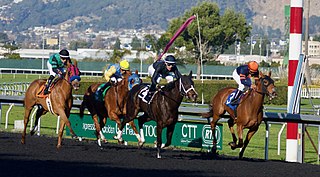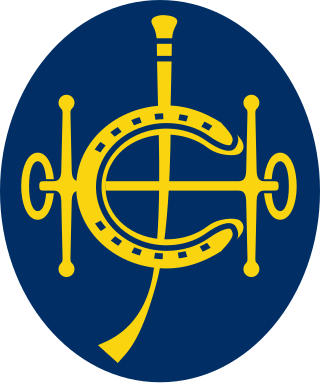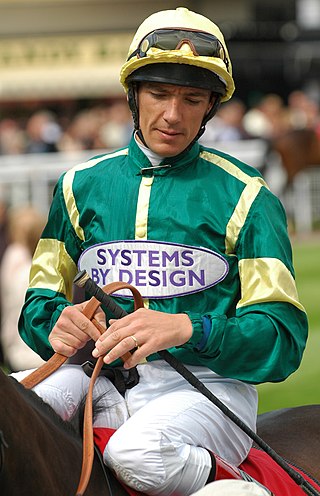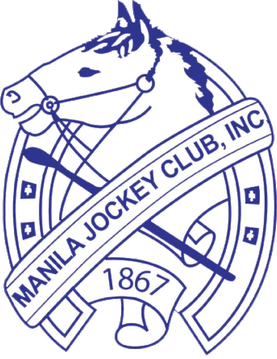Related Research Articles

The Triple Crown of Thoroughbred Racing, often shortened to Triple Crown, is a series of horse races for Thoroughbreds, often restricted to three-year-olds. Winning all three of these Thoroughbred horse races is considered the greatest accomplishment in Thoroughbred racing. The term originated in mid-19th-century England and nations where Thoroughbred racing is popular each have their own Triple Crown series.

Horse racing is an equestrian performance activity, typically involving two or more horses ridden by jockeys over a set distance for competition. It is one of the most ancient of all sports, as its basic premise – to identify which of two or more horses is the fastest over a set course or distance – has been mostly unchanged since at least classical antiquity.

Thoroughbred horse racing is a spectator sport in Australia, and gambling on horse races is a very popular pastime with A$14.3 billion wagered in 2009/10 with bookmakers and the Totalisator Agency Board (TAB). The two forms of Thoroughbred horseracing in Australia are flat racing, and races over fences or hurdles in Victoria and South Australia. Thoroughbred racing is the third most attended spectator sport in Australia, behind Australian rules football and rugby league, with almost two million admissions to 360 registered racecourses throughout Australia in 2009/10. Horseracing commenced soon after European settlement, and is now well-appointed with automatic totalizators, starting gates and photo finish cameras on nearly all Australian racecourses.

The Hong Kong Jockey Club (HKJC) was founded in 1884 and is one of the oldest institutions in Hong Kong. In 1960, it was granted a royal charter and renamed The Royal Hong Kong Jockey Club (英皇御准香港賽馬會). The institution reverted to its original name in 1996 due to the handover of Hong Kong in 1997. Membership of the club is by nomination and election.
The Macau Jockey Club was an organization providing horse racing and betting entertainment in Macau, China. At its peak, the Club was one of the largest private employers of Macau with around 1,400 employees and around 1,100 part-timers.

Lanfranco "Frankie" Dettori, is an Italian jockey who was based in England for a career spanning over 35 years. He was British flat racing Champion Jockey three times and rode the winners of 287 Group 1 races including 23 winners of the British Classic Races. His most celebrated achievement was riding all seven winners on British Festival of Racing Day at Ascot Racecourse on 28 September 1996.

Sha Tin Racecourse is one of the two racecourses for horse racing in Hong Kong. It is located in Sha Tin in the New Territories. It is managed by Hong Kong Jockey Club.

Yutaka Take is a Japanese jockey. Take made his riding debut in 1987 and currently holds seven all-time records in Japan. He has won at least one Grade 1 race for 23 straight years until 2010, and a graded stakes race for 36 consecutive years. Take has 114 wins to his credit in eight countries, including Australia, France, Germany, Hong Kong, Korea, United Arab Emirates, United Kingdom and the United States. His international victories includes Group 1 wins in the Prix d'Ispahan (France) and Hong Kong Cup, two races timed by Longines, the July Cup (England) and Dubai Duty Free Stakes (UAE).

The Singapore Turf Club was founded in 1988 as the Bukit Turf Club to manage horse racing for the Singapore Totaliser Board. It is the only horse-racing club in Singapore and is part of the Malayan Racing Association.

The Queen Elizabeth II Cup is a Group One Thoroughbred horse race at Sha Tin Racecourse in the New Territories, Hong Kong. Established in 1975 by the Royal Hong Kong Jockey Club, it is run annually in April at a distance of 2,000 metres on turf. Prior to 1997 it was run at 2,200 metres. Sponsored by Swiss watchmaker Audemars Piguet since 1999, it currently offers a purse of HK$20 million (US$2.6 million)since 2014/15.

The Champions Mile is a Group 1 flat horse race in Hong Kong for three-year-old and above thoroughbreds run over a distance of 1,600 metres on the turf at Sha Tin Racecourse with the total purse of HK$14m in 2014/15, approximately US$1.8m.
The Hong Kong Gold Cup is a Group One Hong Kong Thoroughbred horse race held annually since 1979 at Sha Tin Racecourse. It is open to horses three years of age and older. Run on turf, it was initially run over a distance of 1,800 metres, but is now set at 2,000 metres and it offers a purse of HK$12,000,000.

Horse racing is a popular equestrian sport in Japan, with more than 21,000 horse races held each year. There are three types of racing that take place in Japan - flat racing, jump racing, and Ban'ei Racing.
The Stewards' Cup is a Hong Kong Thoroughbred horse race held annually during the latter part of January at Sha Tin Racecourse. A Group One race that offers a purse of HK$12,000,000, it is run on turf over a distance of 1600 meters and is open to horses three years of age and older. The first leg of the Hong Kong Triple Crown, it is followed by the Hong Kong Gold Cup in February. and the Hong Kong Champions & Chater Cup in late May/early June.
The Gambling Ordinance was enacted in 1977 to regulate gambling in Hong Kong. People are allowed gamble for leisure and entertainment within these regulations at a limited number of authorized outlets. Social gambling is still allowed.

Silvestre de Sousa is a Brazilian flat racing jockey who is based in Britain and was three times champion jockey.

Horseracing in the Philippines began as a recreational activity in 1867. Its history is divided into three major time periods based on the breed of horses raced, in conjunction with the three significant eras of Philippine history. According to the type of horses used, the periods are the Philippine-pony era (1867–1898), the Arabian-horse era (1898–1930), and the Thoroughbred era (1935–present).

Horse racing in India is over 200 years old. The first racecourse in the country was set up in Madras in 1777. Today, India has a very well-established horse racing and breeding industry, the sport is conducted on nine racetracks by six racing authorities.

The Manila Jockey Club, Inc. (MJC) is a horse racing institution in the Philippines. One of the oldest race clubs in the Asia-Pacific region, the club was established in 1867 in Manila and is based in Carmona, Cavite. It is also a member of the Asian Racing Federation.

Betting on horse racing or horse betting commonly occurs at many horse races. Modern horse betting started in Great Britain in the early 1600s during the reign of King James I. Gamblers can stake money on the final placement of the horses taking part in a race. Gambling on horses is, however, prohibited at some racetracks. For example, because of a law passed in 1951, betting is illegal in Springdale Race Course, home of the nationally renowned Toronto-Dominion Bank Carolina Cup and Colonial Cup Steeplechase in Camden, South Carolina.
References
- ↑ Bruggink, Maurits. "Encouraging Best Practices for Cross-Border Wagering, The Jockey Club". www.jockeyclub.com. Retrieved 2024-11-07.
- ↑ "Hong Kong, Japan Enter Neighbor Policy". www.bloodhorse.com. September 20, 2002. Retrieved 2024-11-07.
- ↑ "Asia tackles offshore betting". BBC News. 2003-09-01. Retrieved 2024-11-07.